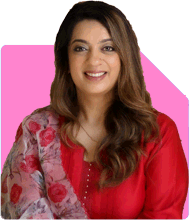Anu Krishna |1746 Answers |Ask -Follow
Relationships Expert, Mind Coach - Answered on Dec 12, 2023
The co-founder of Unfear Changemakers LLP, she has received her neuro linguistic programming training from National Federation of NeuroLinguistic Programming, USA, and her energy work specialisation from the Institute for Inner Studies, Manila.
She is an executive member of the Indian Association of Adolescent Health.... more

I am 37yrs old, married for 6yrs now, my wife - 35yrs, having a kid of 14 months.We both are working. My wife is very dedicated person, and takes care of household . I respect her this attitude and try to contribute in whatever possible ways. My problem is - my brother in law(elder than my wife, and unmarried currently) is staying since 1.5yrs with us. Due to personality differences, it is not easy at all to get along in day to day activities with him. And, my wife gets upset if I hint her - to ask him stay separately. Please help me, how to make her realize this - as it is causing stress and it's not easy at all to continue like this for long.
I am assuming that your brother-in-law is your wife's brother which explains why she may not want to ask him to move out.
But, if there is a general discomfort and personality clashes, I guess you must express your concerns to your wife. Too much of being on each others' faces only causes stress around the house.
See if there can be a WIN-WIN in this situation where the brother-in-law can visit over the weekends or your wife can visit him when she wishes to. That way, she will not feel the pain of asking him to move out.
If this also doesn't work out, do make her aware that this is putting a strain on the marriage. If she cannot talk about this without it upsetting her or understanding the impact of her decision to have her brother at home, then she needs to know that she has begun to take her marriage for granted.
So, talk to her on moving towards the WIN-WIN...that seems like the only way out through this situation.
All the best!
You may like to see similar questions and answers below
Anu Krishna |1746 Answers |Ask -Follow
Relationships Expert, Mind Coach - Answered on Jul 22, 2022
Pooja Khera | Answer |Ask -Follow
Life, Relationship Coach - Answered on Feb 10, 2023
Anu Krishna |1746 Answers |Ask -Follow
Relationships Expert, Mind Coach - Answered on Apr 09, 2024
Anu Krishna |1746 Answers |Ask -Follow
Relationships Expert, Mind Coach - Answered on Apr 29, 2024
Anu Krishna |1746 Answers |Ask -Follow
Relationships Expert, Mind Coach - Answered on Aug 14, 2024
Ramalingam Kalirajan |10876 Answers |Ask -Follow
Mutual Funds, Financial Planning Expert - Answered on Dec 09, 2025
Ramalingam Kalirajan |10876 Answers |Ask -Follow
Mutual Funds, Financial Planning Expert - Answered on Dec 09, 2025
Radheshyam Zanwar |6739 Answers |Ask -Follow
MHT-CET, IIT-JEE, NEET-UG Expert - Answered on Dec 09, 2025
Radheshyam Zanwar |6739 Answers |Ask -Follow
MHT-CET, IIT-JEE, NEET-UG Expert - Answered on Dec 09, 2025
Nayagam P P |10853 Answers |Ask -Follow
Career Counsellor - Answered on Dec 09, 2025
Mayank Chandel |2569 Answers |Ask -Follow
IIT-JEE, NEET-UG, SAT, CLAT, CA, CS Exam Expert - Answered on Dec 08, 2025
Mayank Chandel |2569 Answers |Ask -Follow
IIT-JEE, NEET-UG, SAT, CLAT, CA, CS Exam Expert - Answered on Dec 08, 2025

Mayank Chandel |2569 Answers |Ask -Follow
IIT-JEE, NEET-UG, SAT, CLAT, CA, CS Exam Expert - Answered on Dec 08, 2025
Mayank Chandel |2569 Answers |Ask -Follow
IIT-JEE, NEET-UG, SAT, CLAT, CA, CS Exam Expert - Answered on Dec 08, 2025
Mayank Chandel |2569 Answers |Ask -Follow
IIT-JEE, NEET-UG, SAT, CLAT, CA, CS Exam Expert - Answered on Dec 08, 2025





















